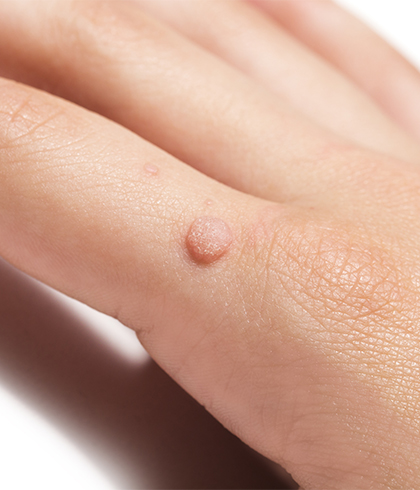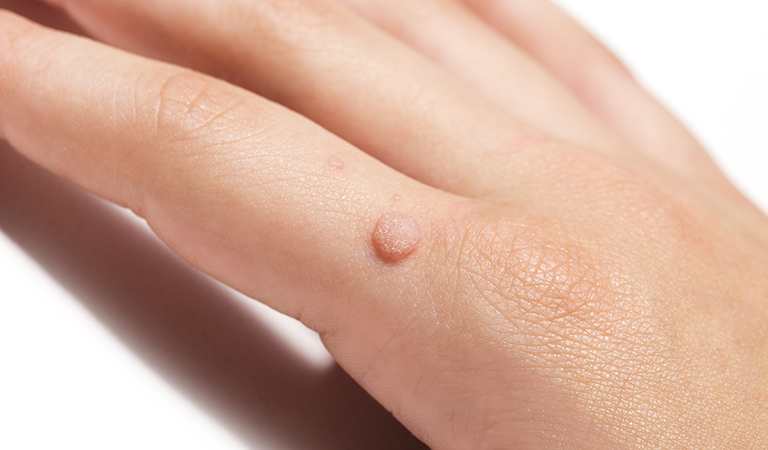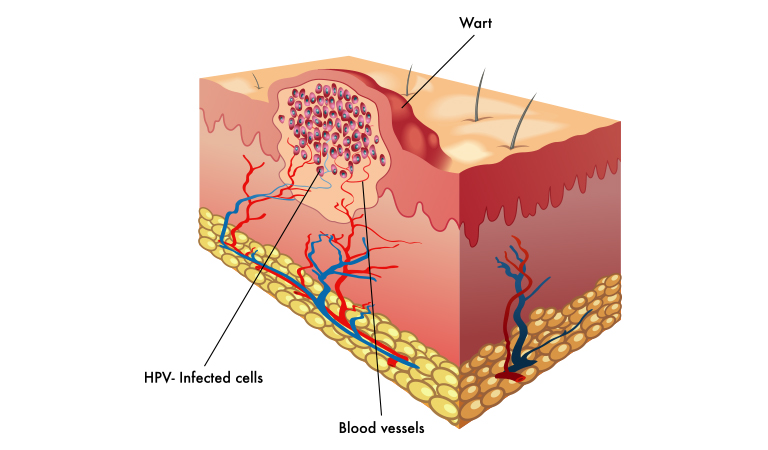

The Most Frequently Asked Questions on Wart Removal
A wart can make you feel embarrassed and self-conscious, especially if it's visible and difficult to conceal. If you're not sure how to deal with these irritants on your skin, you’re not alone! The good news is that warts removal treatment options are now easily available.
In this blog, learn what are warts, what causes warts, the types of warts and the most frequently asked questions on wart removal.
What Are Warts?
Warts, also known as Verruca Vulgaris, are small, painless, benign (non-cancerous) growths on the skin. They are caused by the Human Papilloma Virus (HPV). Although this dermatological condition is not harmful, warts can have a negative psychological impact on patients, leading to low self-esteem and confidence.
What Causes Warts?
According to a study by the National Center for Biotechnology Information (NCBI), approximately 10 of the 150 strains of human papillomavirus cause cutaneous warts or skin warts, while others cause anal warts and genital warts. Warts form when skin cells grow faster than usual due to infection with the Human Papilloma Virus (HPV).

Types of Warts
Warts are classified into several types based on factors such as the HPV that causes them and where they have grown on the body. Here are a few examples:
Also Read: 4 Types of Warts and Their Treatment at Dr Batra's®
Filiform Warts: Filiform warts are not painful; they may irritate you because they grow around your mouth and nose, which are sensitive areas of your face. They also grow much faster than other types of warts.
Plantar Warts: Warts that develop on the soles of the feet are called plantar warts. Plantar warts, unlike other warts, grow into your skin rather than out of it. You most likely have a plantar wart if you find a small hole at the bottom of your foot surrounded by firm skin.
Common Warts: As the name suggests, these are the most common type of warts. They can range in size from a pinhead to a pea. Warts on the hands and feet are common, particularly around the nails. Small black dot-like formations, which are blood clots, are frequently associated with common warts.
Genital Warts: As the name suggests, these warts form around your genital area. They are typically spread through unprotected intercourse. Warts on the genital area can appear singly or in groups. These warts can be extremely painful.
Take a Skin Evaluation Test Now!
Since we now understand what warts are, their causes and types; let us understand the most frequently asked questions on wart removal.
Key Takeaways
- Warts can be embarrassing and hard to hide, affecting your self-confidence.
- Many people are unsure about how to handle warts on their skin.
- There are now many easy treatment options for removing warts.
- This blog explains what warts are and what causes them.
- It also covers different types of warts and answers common questions about wart removal.
FAQs
Can a wart form overnight?
No, according to the National Health Service (NHS), of the United Kingdom it takes around 2 weeks or even months after becoming infected, for a wart or verruca to form.
Can you get warts from touching a wart?
Yes, the virus is highly contagious. Warts can be contracted by touching someone who has them. Warts are most common on the hands, but they can also appear on the feet, face, genitals, and knees.
How can you tell a wart is forming?
Warts are small, ranging in size from a pinhead to a pea, and have the texture of rough, hard bumps. They may have black dots that resemble seeds but are actually tiny blood clots. They usually appear where the skin has been broken, such as from biting your fingernails.
Do genital warts stay with you for life?
A genital wart differs from patient to patient. Genital warts may disappear on their own or with treatment. They can last from a few months to years (with or without treatment), and the majority of them take 2 years to clear up. As per research by the Centers for Disease Control and Prevention (CDC), approximately 30% of all warts disappear within the first 4 months of infection.
Can homeopathy remove warts?
Yes, Homeopathy is a holistic healing approach that is used to remove warts. It treats the condition from the roots. Its goal is to effectively treat the underlying causes of warts to provide you with a long-term solution. According to a study conducted by the NCBI, homeopathic medicines were discovered to be 75-90 percent effective in the treatment of various types of warts.
Also Read: Eight-year-old boy with warts on fingers and face was brought to us for homeopathic treatment.
How long does homeopathy take to cure warts?
Homeopathic medicines' effect can be immediate or it can take 1 or more days to start working, because the medicines do not create the response, but rather stimulate the body's secondary healing response. The time required for symptom relief is not uniform. According to a recent study published in the Indian Journal of Drugs in Dermatology (IJDD), homeopathic treatment for various types of warts, 18 of 19 people with plantar warts were treated in 2.5 months on average.
Which homeopathic medicine is best for warts?
A homeopathy doctor may recommend homeopathic medicines for warts, such as Ruta Graveolens (Ruta), Antimonium Crudum, and Thuja Occidentalis, depending on the type, and severity of the warts. Please keep in mind that homeopathy is an individualized form of treatment, so we recommend that you consult your
local homeopath for a remedy that is best suited to your needs
What deficiency causes warts?
Vitamin B12, according to a study by the NCBI, wart patients had significantly lower mean serum vitamin B12 levels than wart-free patients. Furthermore, they were more likely to have low serum vitamin B12 levels. Plantar wart patients had significantly lower mean serum vitamin B12 levels than non-wart patients.
How do I stop getting warts?
Here are some simple ways to prevent warts:
- Don't share personal goods with someone who has active warts, such as towels.
- Keep your hands and feet dry at all times.
- Don't pick or scratch warts.
- When sharing a bathing facility, wear shower shoes or flip-flops.
Homeopathy Wart Treatment
Homeopathy treatment for warts is one of the most effective options. This is because, unlike other systems of treatment, homeopathy seeks to eliminate the 'root' cause of warts rather than suppressing symptoms. Homeopathy is safe and has no side effects.
The Winchester Hospital conducted a double-blind, placebo-controlled study. For six weeks, 174 people were given homeopathic treatment for warts. This study found that homeopathic treatments are safe to use and have a positive outcome.
Why Dr Batra’s®
Dr Batra’s® is a trusted name in treating skin problems with over 35 years of experience. At Dr Batra's®, we offer our patients personalized and comprehensive warts skin treatment. Our skilled homeopathic dermatologists spend a significant amount of time with the patient, learning about the visible indications and symptoms, the patient's medical history, lifestyle, and other stressors. They will then check 10 mm deep under your skin with Dr Batra's® 3D imaging technology to further evaluate the situation. It assists our doctors in advising a long-term and effective treatment option.
Also Read: 10 Easy Wart Removal Home Remedies
Also Read: Different types of warts and their treatment in homeopathic medicine

